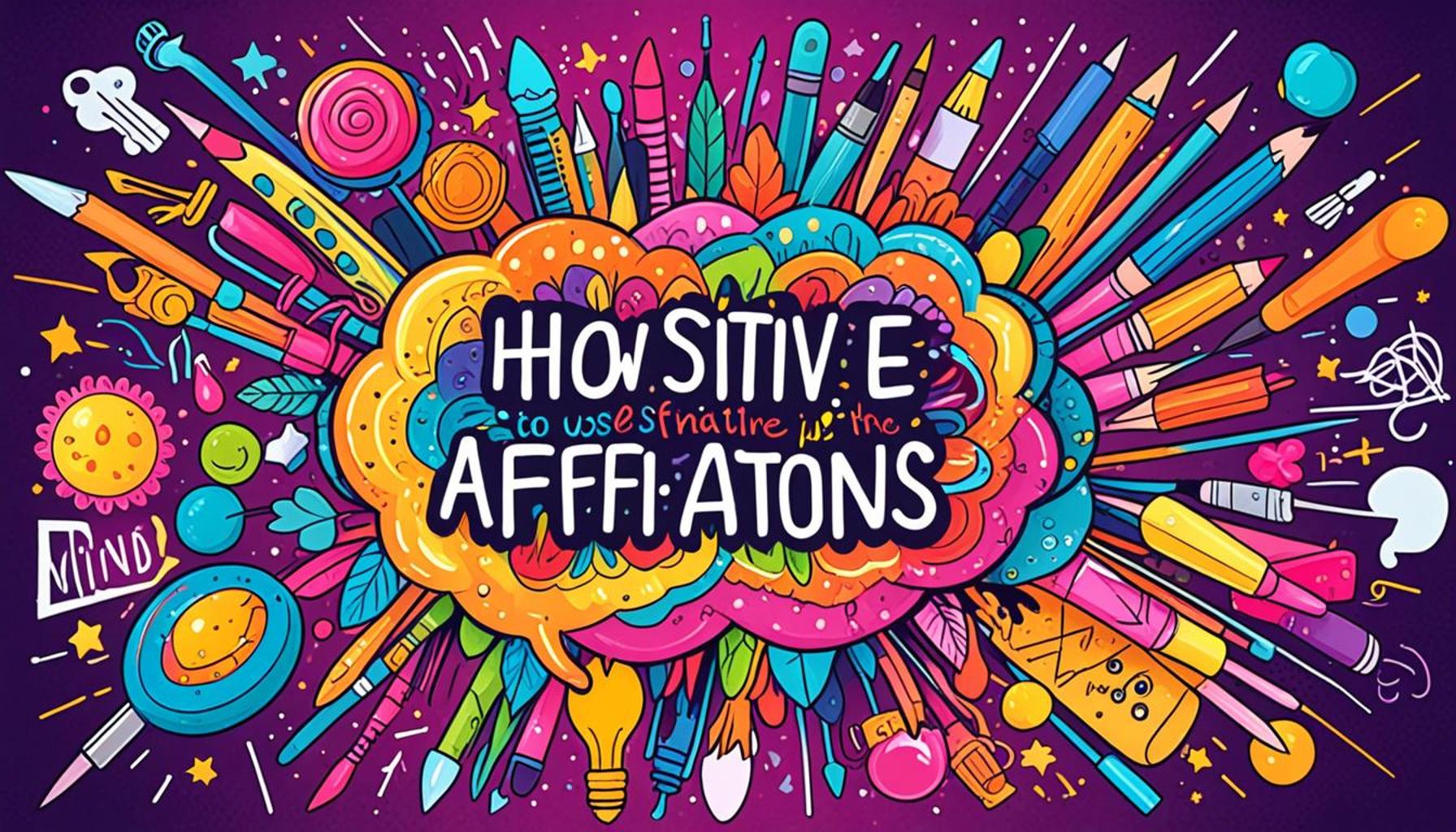How Affirmations Can Help Overcome Mental Confusion and Increase Focus

Understanding Mental Clarity
In today’s fast-paced environment, where technology and obligations continually vie for our attention, achieving clarity of thought can feel like an elusive goal. Mental confusion can arise from various sources, such as overwhelming responsibilities, social media distractions, and the incessant flow of information that bombards us daily. This cognitive cloud can hinder our ability to think clearly and make decisions, often leading to indecision and stress.
The Power of Affirmations
A growing number of individuals are discovering the transformative potential of affirmations. These are straightforward yet powerful statements designed to promote a positive mental environment. By integrating a regular affirmation practice into their daily routines, individuals can experience numerous benefits that enhance their cognitive capabilities.
- Improved clarity in decision-making: Affirmations can help clarify personal values and priorities, making it easier to make choices aligned with one’s goals.
- Enhanced concentration on daily tasks: With a clearer mindset, individuals can focus better on their responsibilities, leading to increased productivity.
- A significant reduction in anxiety and stress levels: Regular affirmation helps in alleviating worries, allowing individuals to approach challenges with a calm demeanor.
- A stronger sense of purpose and motivation: Affirmations can invigorate one’s passion, serving as a constant reminder of personal aspirations.
A Unique Perspective in Nigeria
In Nigeria, the vibrant yet often chaotic urban settings amplify feelings of mental overload. The hustle and bustle of cities like Lagos or Abuja can lead to sensory overload, making it difficult for individuals to find their mental footing. Many reveal that the expectations tied to both family and career paths can create substantial pressure.
Amid these challenges, embracing affirmations serves as a guiding light. For instance, a student preparing for the Joint Admissions and Matriculation Board (JAMB) exams might regularly recite, “I am capable of achieving my academic goals.” Such a statement can bolster confidence and reduce stress, ultimately enhancing exam performance.
The Science Behind Affirmations
Research suggests that practicing affirmations may strengthen neural pathways associated with positive thinking, effectively reprogramming our thought patterns. This brain recalibration can be beneficial not only for students but also for professionals striving to excel in Nigeria’s competitive job market. Whether it’s in finance, tech, or entertainment, a focused mindset is crucial for success.

In conclusion, while the distractions of modern life are significant, the adoption of affirmations offers a practical solution for enhancing mental clarity and focus. As individuals across Nigeria and beyond embrace these simple yet effective tools, they may find themselves better equipped to navigate the complexities of daily life and achieve their fullest potential.
RECOMMENDED: Check out this similar article
The Mechanism of Affirmations
At the core of the effectiveness of affirmations lies their ability to influence our thought patterns and emotional responses. When one regularly engages in positive affirmations, they begin to alter their internal dialogue. This process is akin to rewiring the mind; it helps to dismantle negative thoughts that contribute to mental confusion and replace them with constructive beliefs. For instance, in Nigeria, where societal pressures can often cloud judgment, affirmations can act as mental anchors, stabilizing one’s thoughts amidst the chaos.
Affirmations work through the principle of neuroplasticity—the brain’s ability to reorganize itself by forming new connections throughout life. When repeated, affirmations help strengthen the neural pathways that support positive thinking, ultimately leading to improved focus and mental clarity. So, instead of succumbing to the overwhelming stress of deadlines or personal challenges, individuals can redirect their mental energy towards affirming their abilities and goals.
Practical Applications of Affirmations
To harness the full potential of affirmations, incorporating them into daily routines is essential. Here are practical ways to implement affirmations effectively:
- Mornings: Start your day with positive affirmations. Say statements like, “I am focused and productive today” while looking in the mirror. This sets a positive tone for the day ahead.
- During Breaks: Take moments throughout the day to recite affirmations that resonate with current challenges. For example, a worker in a high-pressure job might say, “I handle challenges with ease and grace.”
- Evenings: Reflect on the day and affirm your accomplishments, no matter how small. Saying, “I am proud of my efforts today” reinforces positivity before bed.
These practical steps not only establish a routine but also create a framework for maintaining mental clarity and focus throughout the day. As individuals begin to integrate these habits, they may notice a marked difference in their decision-making ability and overall mental well-being.
Examples from Daily Life
Consider a Nigerian entrepreneur juggling multiple responsibilities: managing a startup, maintaining relationships, and dealing with personal expectations. Amid this hectic lifestyle, using affirmations like, “I am capable of handling everything with confidence” can cultivate a sense of focus and reduce feelings of being overwhelmed. Such a statement can empower the individual to prioritize tasks effectively and foster a productive mindset.
Moreover, the use of affirmations is not limited to personal or professional challenges; they can also be beneficial in social contexts. For instance, during family gatherings where pressures may heighten, an affirmation such as, “I communicate effectively and with respect” can help maintain composure and clarity in interactions.
As this exploration indicates, affirmations serve as a practical tool, equipping individuals to navigate the complexities of life with enhanced clarity and focus. The simple act of repeating positive statements can indeed be a pathway towards overcoming mental confusion, leading to a more productive and focused life.
Exploring the Impact of Affirmations
Affirmations are powerful tools that can significantly influence our mental clarity and focus. By consciously repeating positive statements, individuals can rewire their thought processes, shifting from a state of mental confusion to one of clarity and direction. This practice has been linked to improved cognitive functions and emotional well-being, as it fosters a more productive and positive mindset.
The Science Behind Affirmations
Research indicates that affirmations can stimulate the brain’s reward centers, reinforcing a positive self-image and enhancing motivation. When you affirm your capabilities, you are likely to feel a surge of confidence, which is crucial in overcoming mental barriers. As a result, clearer thought processes emerge, allowing for improved decision-making and increased focus on immediate tasks. Furthermore, when faced with stress or anxiety, affirmations can serve as effective coping mechanisms that promote resilience.
Implementing Affirmations in Daily Life
To cultivate focus and eliminate mental confusion through affirmations, individuals can incorporate them into their daily routines. Starting the day with tailored affirmations such as “I am clear-minded and focused” can set a positive tone. Pairing this practice with mindfulness techniques, such as meditation or breathing exercises, can further enhance the affirmations’ effectiveness. These statements can be written, spoken aloud, or even recorded for repeated listening, providing a multifaceted approach to mental clarity.
Real-Life Examples and Success Stories
Many individuals and professionals have successfully utilized affirmations to enhance their productivity and reduce mental chaos. Athletes, artists, and corporate leaders have shared their transformative experiences, emphasizing how affirmations have empowered them to concentrate better on their goals. Through consistent practice, they report not only improved focus but also a marked reduction in feelings of overwhelm.
| Category | Description |
|---|---|
| Mental Clarity | Affirmations guide individuals towards clearer thinking. |
| Increased Focus | They enhance concentration by reinforcing positive mindsets. |
By integrating affirmations into daily practices, individuals can promote a clearer mind and sharper focus, ultimately leading to greater productivity and emotional resilience.
CHECK OUT: Click here to explore more
Building Resilience Through Affirmations
Beyond just increasing focus, affirmations play a pivotal role in building resilience against the mental challenges that often lead to confusion. Mental resilience refers to the ability to bounce back from stress and adversity. In Nigeria, where rapid changes and uncertain economic conditions can exacerbate feelings of stress, cultivating resilience through affirmations becomes essential. By regularly incorporating affirmations that promote strength and adaptability, individuals can mentally prepare themselves for life’s unpredictability.
For example, someone facing job insecurity might use the affirmation, “I am resilient and adaptable to change.” This statement not only encourages a proactive mindset but also fosters an environment where challenges are seen as opportunities for growth rather than insurmountable obstacles. By reinforcing a positive self-image, affirmations can effectively shift the perception of difficulties, allowing for greater concentration on overcoming them instead of succumbing to confusion and fear.
Affirmations in Education
Affirmations are also especially effective in educational settings, aiding students in overcoming mental confusion that often accompanies academic pressures. As students in Nigeria navigate multi-faceted examinations and the demands of higher education, incorporating affirmations into their study routines can enhance focus and reduce anxiety. A student might say, “I am capable of understanding new concepts and excelling in my studies.” This affirmation boosts confidence and reduces mental clutter, equipping students with the mindset to tackle challenging subjects head-on.
- Utilizing Vision Boards: By pairing affirmations with visual representations of goals, such as vision boards, students can enhance their focus and clarity. This multimodal approach reinforces the desired mindset.
- Group Settings: Students can create group affirmations during study sessions, fostering a collaborative environment that reinforces collective motivation, transforming the atmosphere into one of positivity and encouragement.
The Science Behind Affirmations
Recent research has brought to light the profound effects that affirmations can have on the brain’s functioning. Studies have shown that engaging in affirmations activates the brain’s reward centers, releasing dopamine, a neurotransmitter responsible for feelings of pleasure and satisfaction. In a highly competitive society like Nigeria’s, where academic and professional achievements are highly valued, utilizing affirmations can create a positive feedback loop, enhancing focus and motivation.
Furthermore, affirmations can help calm the amygdala, the part of the brain responsible for processing stress and emotions. In emotionally charged environments, such as during critical business negotiations or family discussions, affirmations like “I approach each situation with calm and clarity” keep the mind focused and less reactive, ultimately preventing confusion.
Encouraging Emotional Well-Being
The emotional aspect of mental clarity cannot be overstated. Affirmations that emphasize emotional well-being contribute significantly to overcoming confusion and distractions. Phrases such as “I embrace my emotions and express them healthily” encourage emotional intelligence, allowing individuals to navigate relationships and social dynamics more effectively. This is particularly relevant in diverse social structures in Nigeria, where familial and communal values often interplay with individual aspirations.
By fostering an environment where emotions are acknowledged and affirmatively expressed, people can reduce the cognitive dissonance that often breeds confusion and distracts from meaningful pursuits. In essence, affirmations act as tools not merely for individual focus but also for fostering healthier social interactions.
SEE ALSO: Click here to read another article
Conclusion
In a world often overwhelmed by stress and uncertainty, especially in contexts like Nigeria with its unique challenges, affirmations emerge as powerful tools for enhancing mental clarity and focus. The practice of repeating positive statements can significantly mitigate mental confusion and instill a sense of resilience, enabling individuals to adapt to change and overcome adversity. These affirmations not only foster a positive self-image but also encourage a proactive approach to challenges, transforming obstacles into opportunities for personal growth.
Moreover, the scientific backing behind affirmations emphasizes their role in affecting brain function, promoting the release of dopamine and soothing stress responses. For students, professionals, and anyone navigating the complexities of life, integrating affirmations into daily routines can cultivate an environment of clarity and motivation, reducing distractions and enhancing concentration. As highlighted, whether through individual practice or collaborative settings like study groups, affirmations can collectively elevate focus and emotional well-being.
It is evident that by deliberately nurturing our thoughts through the use of affirmations, we create pathways to improved mental health, better academic performance, and more meaningful interactions. As this practice gains traction, embracing it can lead to significant personal transformation. Therefore, incorporating affirmations into your daily life could be the first step towards a more focused, resilient, and uplifted existence.


